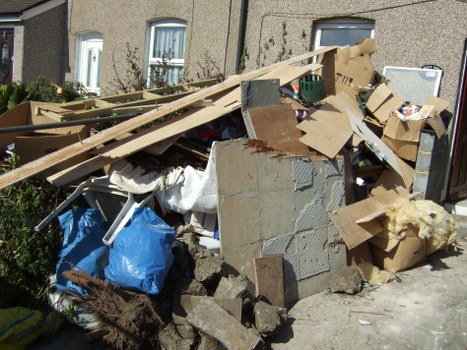Comprehensive Waste Recycling Services in Coney Hall

Introduction to Waste Recycling
Waste recycling is a crucial component of sustainable living, significantly impacting environmental conservation and resource management. In Coney Hall, waste recycling services play a pivotal role in maintaining the community's cleanliness and ecological balance. These services not only reduce landfill burden but also promote the reuse of materials, contributing to a greener future.
Recycling involves the collection, processing, and transformation of waste materials into new products. This cycle minimizes the need for raw materials, conserves energy, and decreases greenhouse gas emissions. Effective waste recycling services in Coney Hall ensure that residents and businesses adhere to eco-friendly practices, fostering a culture of sustainability.
Understanding the various waste types and the appropriate recycling methods is essential for maximizing the benefits of recycling programs. From household waste to industrial byproducts, each category requires specific handling to ensure efficiency and compliance with environmental regulations.

Types of Waste Recycled
Organic Waste
Organic waste, including food scraps and garden waste, constitutes a significant portion of household refuse. Recycling organic waste through composting not only reduces landfill volume but also produces nutrient-rich compost that can be used to enrich soil quality.
Plastic Waste
Plastics are widely used but pose substantial environmental challenges due to their non-biodegradable nature. Recycling plastics involves sorting, cleaning, and reprocessing them into new plastic products, reducing the reliance on virgin plastic production and mitigating pollution.
Paper and Cardboard
Paper and cardboard recycling is one of the most common practices in waste management. Recycled paper products decrease the demand for timber, conserve water, and reduce energy consumption associated with paper manufacturing.

Benefits of Recycling Services in Coney Hall
The implementation of waste recycling services in Coney Hall offers numerous advantages. Environmental benefits include reduced pollution, conservation of natural resources, and lower greenhouse gas emissions. Economically, recycling creates job opportunities in the collection, processing, and manufacturing sectors.
Moreover, recycling services promote community engagement and awareness about environmental issues. Educational initiatives and accessible recycling facilities encourage residents to participate actively in sustainability efforts, leading to a more environmentally conscious population.
Additionally, effective recycling programs can lead to cost savings for both households and businesses by lowering waste disposal fees and promoting the reuse of materials, thereby improving overall economic efficiency.

How to Access Waste Recycling Services in Coney Hall
Residential Services
Residents of Coney Hall can access waste recycling services by participating in the local curbside pickup programs. These programs typically involve separating recyclable materials from general waste and placing them in designated bins for collection.
Commercial Services
Businesses in Coney Hall can benefit from tailored recycling services that cater to their specific waste management needs. Commercial recycling solutions often include regular pickups, on-site consultations, and customized recycling plans to optimize waste reduction.
Community Recycling Centers
Coney Hall is home to several community recycling centers where individuals can drop off recyclable materials. These centers provide convenient locations for disposing of items that may not be collected through regular pickup services, such as electronics, batteries, and bulky waste.

Best Practices for Effective Recycling
- Proper Sorting: Ensure that recyclable materials are correctly sorted to prevent contamination and improve processing efficiency.
- Clean and Dry: Rinse and dry recyclable items to remove food residue and moisture, which can interfere with the recycling process.
- Educate and Inform: Stay informed about the types of materials accepted by local recycling programs and educate others to enhance community participation.
- Reduce and Reuse: Prioritize reducing waste generation and reusing items before considering recycling as a solution.
- Support Recycling Initiatives: Participate in local recycling events and support policies that promote sustainable waste management practices.
Challenges in Waste Recycling
Despite the benefits, waste recycling services in Coney Hall face several challenges. Contamination of recyclable materials is a significant issue, as improper sorting can reduce the quality of recyclables and hinder the efficiency of recycling processes.
Economic constraints also pose challenges, as the costs associated with recycling infrastructure and operations can be high. Securing funding and resources to maintain and expand recycling programs is essential for their long-term success.
Additionally, public awareness and participation levels impact the effectiveness of recycling services. Continuous education and community engagement are necessary to overcome complacency and encourage responsible recycling habits.
Future of Waste Recycling in Coney Hall
The future of waste recycling in Coney Hall looks promising, with ongoing advancements in recycling technologies and increased emphasis on sustainability. Innovations such as automated sorting systems and improved recycling processes will enhance the efficiency and capacity of recycling programs.
Moreover, the integration of circular economy principles will further promote the reuse and repurposing of materials, reducing waste generation and fostering a sustainable community. Collaborative efforts between local authorities, businesses, and residents will drive the progress of recycling initiatives, ensuring a cleaner and more sustainable Coney Hall.
Investment in Technology
Investing in cutting-edge recycling technology will enable Coney Hall to handle a diverse range of waste materials more effectively. Advanced machinery and software can streamline sorting processes, increase recycling rates, and reduce operational costs.
Community Engagement
Continued community engagement and education initiatives will be crucial in maintaining high participation rates and promoting environmentally responsible behaviors among residents and businesses.
Policy and Regulation
Implementing supportive policies and regulations will provide a framework for sustainable waste management practices. Incentives for recycling and penalties for non-compliance can drive positive change and ensure the success of recycling programs.
Conclusion
Waste recycling services in Coney Hall are integral to fostering a sustainable and environmentally conscious community. By embracing recycling practices, residents and businesses can contribute to the preservation of natural resources, reduction of pollution, and overall improvement of the local ecosystem.
Addressing the challenges and leveraging the opportunities in waste recycling will ensure the continued success and expansion of these services. Together, the community can build a greener future through effective waste management and recycling initiatives.
Contact us today to learn more about how you can contribute to waste recycling efforts in Coney Hall and make a positive impact on the environment.